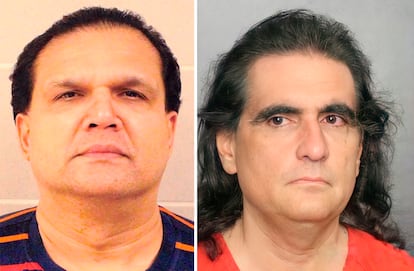Fat Leonard and Alex Saab’s interesting story
The U.S. government had in custody one of Maduro’s most notorious financial operators, while the Venezuelan strongman had in his jail the person who bribed a number of top military officers and their civilian accomplices

His name is Leonard Glenn Francis, but everyone called him Fat Leonard. His company, Glenn Defense Marine Asia, made him very wealthy. His business was supplying — food, fuel, etc. — to U.S. Navy ships in Asian ports. Fat Leonard became good friends with the American admirals and captains who went to his parties. He was a generous host, and everybody knew that his already large fortune continued to grow.
Something similar happened with Alex Saab. He is a key financial operator for Nicolás Maduro and his associates worldwide. Saab started with a small trucking company in Colombia but moved to Caracas and quickly gained the trust of influential players in the Bolivarian Revolution. Relying on his new friends, he began to launch increasingly ambitious business schemes.
As far as we know, Alex Saab and Fat Leonard have never met. Yet their lives are intertwined in surprising ways. Both understood that buying low and selling high to the government is a sure path to riches. Both also experienced the risks of this business model: each man ended up in jail as a result of Hollywood-worthy international schemes. But it gets even more involved: just before last Christmas, the two were exchanged by two governments with very different ways of approaching corruption.
Fat Leonard, despite being Malaysian, made his fortune by weaving an extensive web of corruption within the U.S. Navy, bribing high-ranking naval officers with money, trips, meals and prostitutes. Alex Saab also succeeded. According to the U.S. government, Saab illicitly took out about $350 million by manipulating the Venezuelan foreign exchange regime. This is just one of the cases documented by the U.S. justice system.
And the surprises continue: after a series of bizarre entanglements, both men ended up in custody of the rival government — the man who fiddled with Venezuela’s exchange rate wound up in an American jail while the man who corrupted US Navy officers was jailed in Venezuela.
Saab was arrested in Cape Verde, a small island off the coast of West Africa where the private jet in which he was traveling had landed to refuel and then continue its flight from Venezuela to Iran.
He never got there.
The U.S. government had asked the government of Cape Verde to detain and extradite him. Washington was keen to interrogate Saab about the billions of dollars of public money that evaporated from the Bolivarian Republic of Venezuela. Cape Verde thus became the scene of an improbable diplomatic tug-of-war between Caracas and Washington.
Fat Leonard was tried in the United States and was under house arrest in San Diego, California, awaiting the start of his prison sentence. The judge had agreed to the house arrest arrangement on the condition that Fat Leonard would cover the costs of the security team that ensured that he would not escape.
That, of course, was exactly what he did. He broke out and ended up in Caracas. Nicolás Maduro and his associates obviously knew how useful it could be to have Fat Leonard as a bargaining chip for a prisoner exchange with the United States. So, they threw him in jail.
The U.S. government had in custody one of Maduro’s most notorious financial operators, while the Venezuelan strongman had in his jail the person who bribed a number of top military officers and their civilian accomplices. But that is where the parallelism ends: the U.S. wanted Fat Leonard to jail him, while Venezuela wanted Alex Saab to free him.
It is not known why Saab matters so much to Maduro. But judging by the unusual efforts dedicated to getting him out, the secrets Saab keeps for Maduro and the rest of the presidential clique must be very important.
In the end, the destinies of the two characters crisscrossed in the context of a diplomatic negotiation in Barbados, through which the international community dreamed, in vain, of reviving Venezuela’s democracy. Talks were held in the hopes of leading to a democratic presidential election following a “prisoner exchange.” Maduro let it be known that Fat Leonard, along with other American hostages in exchange for Alex Saab — was the condition that would make the rest of the agreement viable. The prize: a legitimate presidential election in Venezuela, was worth gambling on, U.S. President Biden decided.
It did not happen. While just before last Christmas the prisoner exchange took place, in March of 2024, Maduro reneged on his promise. He anointed himself as a candidate for a forthcoming presidential election that was neither free nor fair. Also, Maria Corina Machado, an opposition leader and the country’s most popular politician was to remain arbitrarily disqualified from running.
Once again, Maduro made a mockery of the State Department’s diplomats that he and his partners manipulate with such ease, as well as of the White House, and of Washington’s intelligence services.
The Barbados agreement failed. It will go down in history as a footnote that cost Leonard Glenn Francis many years in prison and gave Alex Saab many years of freedom.
Sign up for our weekly newsletter to get more English-language news coverage from EL PAÍS USA Edition
Tu suscripción se está usando en otro dispositivo
¿Quieres añadir otro usuario a tu suscripción?
Si continúas leyendo en este dispositivo, no se podrá leer en el otro.
FlechaTu suscripción se está usando en otro dispositivo y solo puedes acceder a EL PAÍS desde un dispositivo a la vez.
Si quieres compartir tu cuenta, cambia tu suscripción a la modalidad Premium, así podrás añadir otro usuario. Cada uno accederá con su propia cuenta de email, lo que os permitirá personalizar vuestra experiencia en EL PAÍS.
¿Tienes una suscripción de empresa? Accede aquí para contratar más cuentas.
En el caso de no saber quién está usando tu cuenta, te recomendamos cambiar tu contraseña aquí.
Si decides continuar compartiendo tu cuenta, este mensaje se mostrará en tu dispositivo y en el de la otra persona que está usando tu cuenta de forma indefinida, afectando a tu experiencia de lectura. Puedes consultar aquí los términos y condiciones de la suscripción digital.









































